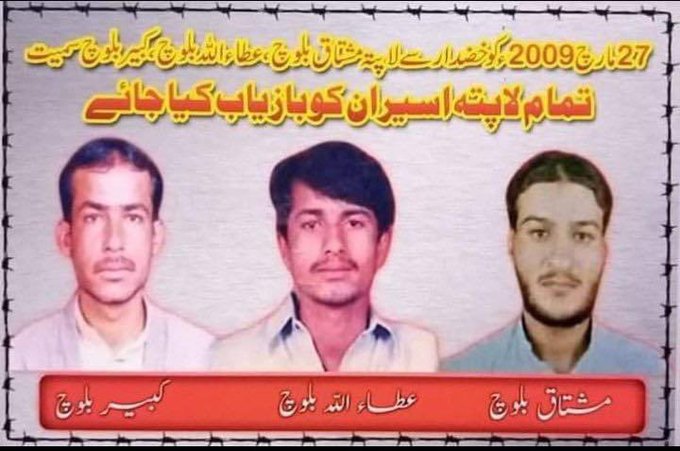Amnesty International & HRCP call out government on enforced disappearances

- Date
 Xari Jalil
Xari Jalil
LAHORE
On March 27, 2009, political workers Kabir Baloch, Mushtaq Baloch and Attaullah Baloch were abducted from outside the Khuzdar Sessions court. Fifteen years later they continue to be missing.
Today, 15 years later, a campaign will be held from 7 pm to midnight where civil society is expected to come forward on social media X and demand for the release of the three missing persons using the hashtag #EndEnforcedDisappearances.
The Human Rights Commission of Pakistan (HRCP) on Wednesday, slammed the government’s handling of enforced disappearances in Balochistan. In a statement, the HRCP highlighted that the families of the three missing persons have already registered cases with the state run Commission of Inquiry on Enforced Disappearances (COIED), yet remain completely in the dark about their loved ones’ fates.
HRCP further condemned the state’s inability to locate its own citizens, let alone identify and punish those responsible. This ongoing failure, the statement argues, exposes a deeply flawed policy towards Balochistan and a callous disregard for its people. The organization demanded an end to this “indifference” and called for transparency and accountability from the COIED, along with a clear commitment from the new government to eradicate the horrific practice of enforced disappearances.
“These three individuals were taken from right outside the Sessions court,” says Farhatullah Babar, adding that the State had not as much as responded to their families’ protests or questions, in fact they blamed them. “This act of abducting and disappearing people is illegal, unethical and inhuman. It is unimaginable the kind of pain the families are going through that they do not even know whether their loved ones are alive or not – and if they are alive what condition they must be in. Everyone must speak out against these enforced disappearances.”
Meanwhile Amnesty in a recently released report has highlighted enforced disappearances as one of the biggest human rights violations in the country, particularly prevalent in Balochistan and Khyber Pakhtunkhwa (KP) and which have been used as a tool of political suppression to target and silence dissenters – including journalists, human rights defenders and minorities.
COIED reports that it has recorded a total of 10,078 enforced disappearances since 2011, with 3485 and 2752 from KP and Balochistan respectively. But it also noted in its report that there is no law criminalizing enforced disappearances in the country and Pakistan has not signed the International Convention for the Protection of All Persons from Enforced Disappearances.
Amnesty International has extensively documented harassment and intimidation faced by families of the forcibly disappeared, more recently through excessive use of force against the Baloch Long March in December 2023.
Amnesty has come up with recommendations that it urges the newly formed Pakistan government to follow in line with the international human rights laws and obligations that Pakistan has signed.